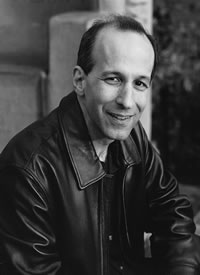|
Here are two stories I like to tell. The first is about my father who, in World War II, was scouting out enemy territory with three other American soldiers when they came upon a band of seventy armed Germans. My father and his battalion mates were unarmed, so the Germans were going to take them prisoner. But my father had gone to law school and he knew the art of persuasive argument. The problem was, he didn't speak German. He did, however, speak Yiddish. So in 1944, speaking what he calls "Teutonized Yiddish," my father convinced the Germans that they were about to lose the war and he got them to lay down their arms.
The second story takes place in 1968, when I was at nursery school on Manhattan's Upper West Side. It was Christmastime and there was hubbub that day; Santa Claus was visiting. All the kids were shouting, "Where's Santa Claus? Where's Santa Claus?" And then, in a moment of silence, a voice rang out: "Who's Santa Claus?" That was me.
A Jewish lieutenant speaking Yiddish to German soldiers in World War II. A boy of four, living in one of the biggest cities in the world, who doesn't know who Santa Claus is. These are what I like to call "pleasing contradictions," and they are, it seems to me, the lifeblood of a fiction writer. I teach writing now, to undergraduates and MFA students at Sarah Lawrence College and Brooklyn College, and when I tell my students that they need to find conflict in their stories, I'm really telling them to look for the pleasing contradictions, since contradiction is what makes fiction interesting, what allows a writer to explore character.
|


